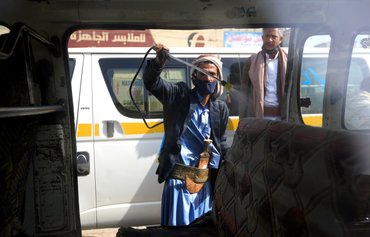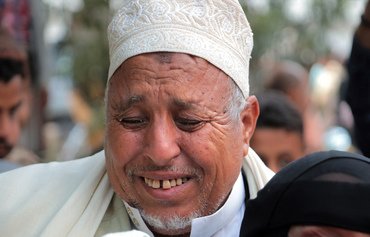All parties to the Yemen conflict are being asked to immediately release all detainees and political prisoners they are holding in order to prevent and mitigate the risks of novel coronavirus (COVID-19) contagion.
In a March 30th statement, the Group of Eminent International and Regional Experts on Yemen of the Office of the High Commissioner for Human Rights expressed deep concern about the potential risks of the spread of COVID-19 among the prison population.
Yemen's health sector, which has been devastated by five years of war, is operating at less than 50% of its capacity, according to the Ministry of Health.
"Prisoners and detainees in Yemen are particularly vulnerable and exposed to substantial risk if COVID-19 was to emerge in prisons and other detention facilities," the experts said.
In a September 2019 report to the Human Rights Council, the experts noted "the appalling detention conditions" investigators had discovered.
"Necessary physical distancing and self-isolation will be impossible in such overcrowded facilities thereby allowing the virus to rapidly spread in the event it appears," the experts said in their March 30th statement.
"The panel of experts' statement should be directed at the Houthis (Ansarallah)," said Deputy Minister of Human Rights Nabil Abdul Hafeez.
He told Al-Mashareq the Yemeni government has expressed its willingness to exchange prisoners with the Iran-backed militia since the Stockholm agreement of December 2018.
The panel's statement is in line with UN Secretary-General Antonio Guterres' appeal for a Yemen ceasefire to curtail the spread of the coronavirus, he said.
The statement made its demands to both sides, he noted, "when it should have directed them at the Houthis, since they are the side that is being intransigent and reneging on its pledges".
#SaveYemeniPrisoners campaign
On March 31st, Yemeni human rights groups and activists inside and outside Yemen launched a two-day online campaign, #SaveYemeniPrisoners.
The campaign aimed to pressure all Yemeni parties to release their detainees, in view of the poor conditions in prisons that put the lives of detainees at risk.
The campaign "is primarily a humanitarian one", lawyer and human rights activist Huda al-Sarari told Al-Mashareq.
In addition to the online campaign, it seeks to collect signatures on a petition demanding the release of prisoners and to issue a statement signed by the participating human rights groups, she said.
The campaign is calling on international organisations to pressure the warring sides to release prisoners, she said.
It is also taking this message to "law enforcement agencies, the prosecution, the judiciary and entities authorised to release the prisoners".
"The purpose of the campaign is to secure the unconditional release of prisoners of conscience, politicians and journalists and those arrested without any legal justification," al-Sarari said.
Prisons in Yemen exceed capacity
Some provinces have launched their own initiatives to release prisoners, al-Sarari said, noting that activists are encouraging such initiatives.
"Prisons in Yemen exceed their absorptive capacity and lack the minimum level of health and safety requirements and means of protection," she said.
Prisoners are malnourished, "suffer from the spread of epidemics and diseases, and are not provided with any health care", she added.
She called on international organisations and parties sponsoring the peace process in Yemen to pressure the Houthis to speed up the release of detainees before an outbreak occurs.
Lawyer and human rights activist Abdul Rahman Barman also called on the international community and the UN to "pressure the Houthis to fulfill their commitments with regard to releasing the detainees in their prisons".
This is called for under the terms of the Stockholm agreement, he said, through which the government has agreed to exchange prisoners with the Houthis.
"The detainees in Houthi prisons, who include politicians and journalists, were arrested in their homes without real charges, other than their opposition to the Iran-affiliated militia or its tampering with state institutions," Barman added.

![Yemeni prisoners, said to belong to the Yemeni forces, kiss the ground following their release by the Houthis from the central prison in Sanaa before being handed over to their families on September 30th, 2019. [Mohammed Huwais/AFP]](/cnmi_am/images/2020/04/09/23418-Yemen-prisoners-Sanaa-600_384.jpg)






